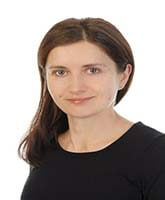Abstract:
During the presentation factors affecting beef quality will be discussed, starting from cattle diet, followed by ageing period and thermal treatment used, and the results of our own research will be presented.
In the past, beef was produced from pasture-fed cattle carcasses, whereas nowadays, grain finishing is more and more common among beef cattle producers. It has been shown that animal nutrition plays an important role in the regulation of biological processes taking place in muscles e.g., muscle protein turnover. A way the beef is produced affects the meat quality and significant differences have been reported between the quality of beef obtained from feedlots and pasture-fed beef. The quality of beef obtained from feedlot finished cattle might be improved by supplementing the diet with herbs. During the presentation, results of a study aimed to determine the influence of two herbal preparations added to cattle diet will be presented. The supplementation of the bulls' diet with two herbal preparations had a beneficial impact on technological properties and sensory tenderness of beef. The herbal extracts had no negative effect on lipid oxidation or the sensory attributes of beef.
The technological operation, which is used to improve beef tenderness is ageing, and therefore the combined effect of ageing and diet supplementation on beef quality, including tenderness and other eating quality attributes was investigated. For meat producers it is profitable to reduce aging time because with a longer ageing time, a higher cost must be borne. Significant changes in meat quality were noted in our study during, such as decrease in moisture and expressible water contents, Warner-Bratzler Shear Force and intensity of untypical taste and increase in colour parameters values and tenderness. It was also shown that using herbal preparations in a dietary treatment enabled to obtain 9-d aged beef with similar tenderness as compared with 14-d aged beef from control treatment.
Another factor affecting meat quality, including its nutritional value is thermal treatment method. The effects of popular thermal processing method, sous vide and steam cooking, on minerals and fatty acid composition, Warner-Bratzler shear force (WBSF) and eating quality of beef will be presented. Our studies shown that thermal treatment method used for beef preparation affected mineral compound contents and fatty acid composition and that the consumption of steam-cooked beef is more beneficial from a mineral nutritional perspective than sous vide beef.
Audience take away:
- Issues and challenges in the production of high quality beef
- Analytical methods used in the evaluation of meat quality
- Evaluation of nutritional value of beef and fulfilment of requirements for minerals




